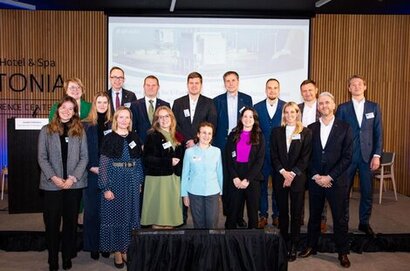
The conference took place in Pärnu, Estonia on 12 November 2024, organized by the European Economic and Social Committee (EESC) and bringing together the Netherlands Embassy in Estonia, the Pärnu County Development Centre, the Metrosert Applied Research Centre, Invest Estonia and the e -methanol plant developer Power2X.
The objective of the conference revolved around discussing and identifying strategic actions for the development of sustainable infrastructure for hydrogen and its derivatives, focusing on financing and usage.
Green and low-carbon hydrogen are crucial components in our energy transition and recent initiatives, such as the EU Hydrogen Bank, have highlighted that there is momentum in developing sustainable hydrogen markets. Sustainable hydrogen is particularly important for the decarbonisation of the transportation sector and other hard-to-abate industries.
Unlike traditional fossil-derived gasoline and diesel, synthetic e-fuels are created using renewable sources and are manufactured by combining captured carbon dioxide or carbon monoxide with hydrogen obtained from water split using low-carbon electricity sources such as wind, solar and hydro. The resulting fuels can serve as drop-in replacements for fossil fuels, offering a low overall carbon footprint, and are particularly relevant for reducing greenhouse gas emissions in long-distance freight, marine and air transport.
EU and national policy makers have a key role in providing the necessary means to put these ambitions into practice and can ease cooperation among Member States to adopt effective strategies. They can also facilitate the exchange of best practices that aim to increase hydrogen production capacity. This approach will ensure that the future EU hydrogen sector meets environmental and social standards while being financially viable.
“The rapid deployment of renewable hydrogen is critical – not only for the transformation of our energy system but also for the social and economic well-being of the European Union” said Baiba Miltoviča, president of the EESC's Section for Transport, Energy, Infrastructure and the Information Society.
“However, it's essential that we direct our resources wisely. To maximize our impact, we need to prioritize hard-to-abate conditions and establish effective ecological and social standards that ensure fair and safe working.”
For additional information:

